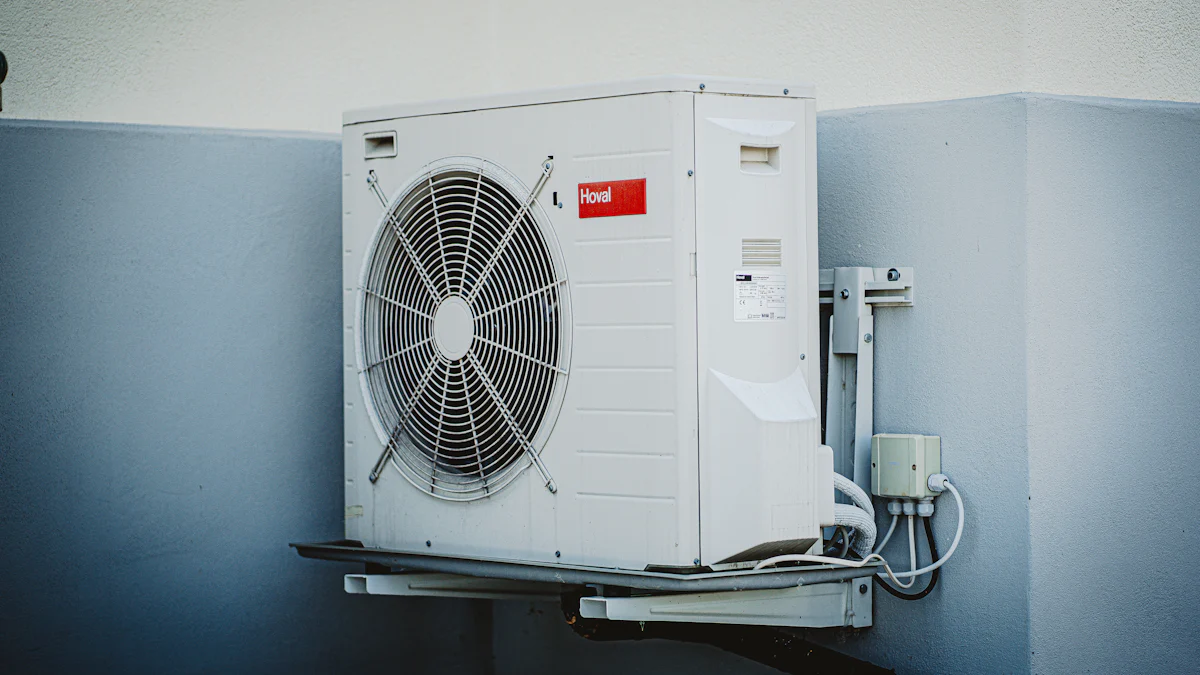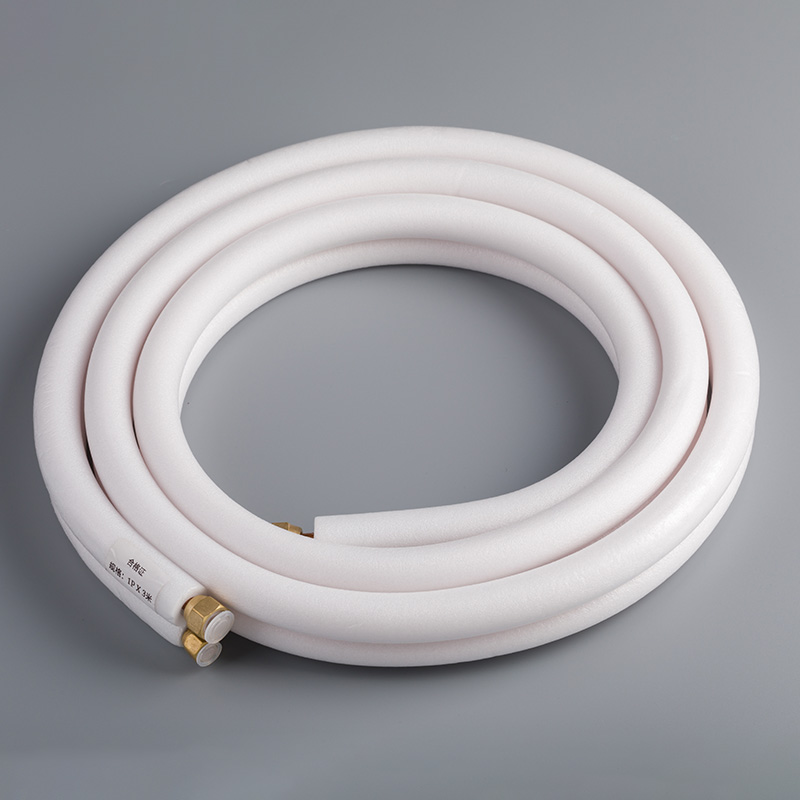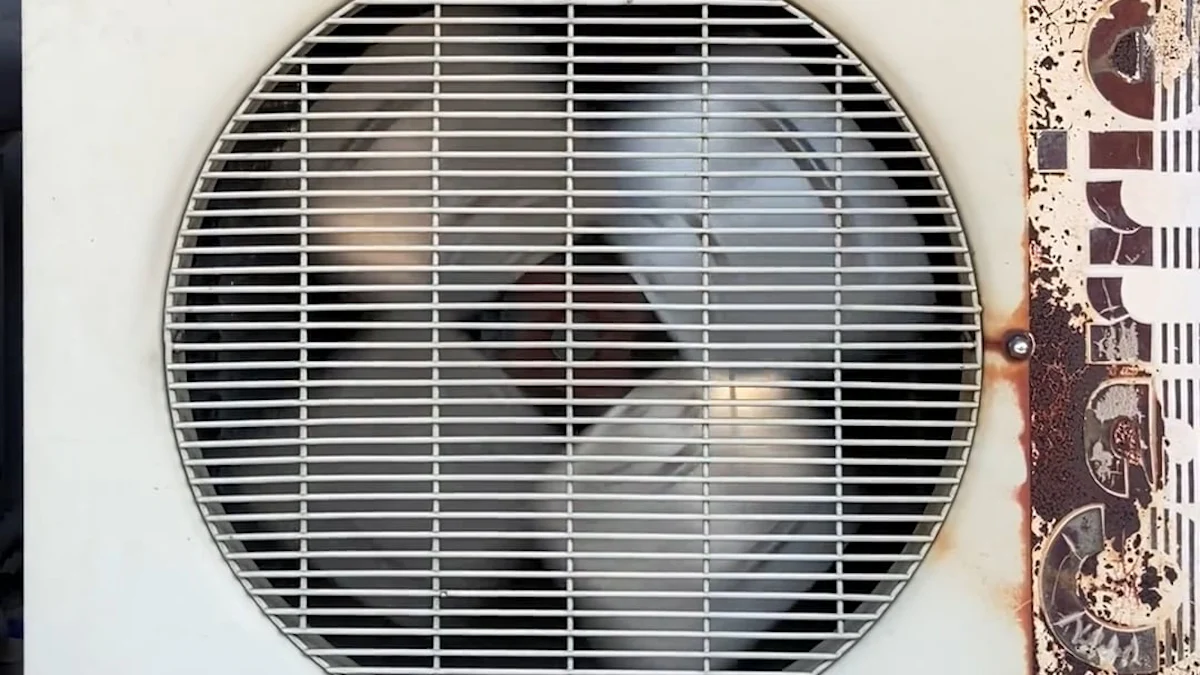Effective Ways to Protect AC Copper Pipes from Corrosion

Proper maintenance of your air conditioner copper pipes is essential for the longevity and efficiency of your cooling system. Air conditioner copper pipe corrosion can result in refrigerant leaks, which undermine performance and escalate repair expenses. To safeguard these pipes from corrosion, consider implementing preventive measures such as using an air conditioner copper pipe cover or other protective solutions. By taking these steps, you ensure that your air conditioner copper pip remains in optimal condition, delivering reliable cooling for years to come.
Understanding Air Conditioner Copper Pipe Corrosion
What is Corrosion?
Corrosion is a natural process that gradually deteriorates metals through chemical reactions with their environment. In the context of air conditioner copper pipes, corrosion occurs when the protective film inside the pipe breaks down. This breakdown exposes the copper to water and other corrosive elements, leading to damage over time.
Types of Corrosion Affecting Copper Pipes
Copper pipes in air conditioning systems can suffer from various types of corrosion:
Pitting Corrosion: This type involves small, localized areas of metal loss, often leading to pinhole leaks. It usually results from exposure to oxidizing acids or heavy-metal salts.
Uniform Corrosion: This occurs evenly across the surface, causing a gradual thinning of the pipe walls.
Galvanic Corrosion: When copper pipes come into contact with dissimilar metals, an electrochemical reaction can occur, accelerating corrosion.
Why is Corrosion a Problem for AC Systems?
Corrosion poses significant challenges for air conditioning systems. It directly impacts the efficiency and performance of your AC unit. When corrosion affects the copper pipes, it can lead to refrigerant leaks. These leaks reduce the cooling efficiency, making your system work harder to maintain the desired temperature.
Impact on Efficiency and Performance
Corroded pipes can cause a decline in the overall performance of your air conditioner. The system may struggle to cool your space effectively, leading to increased energy consumption and higher utility bills. Moreover, the presence of corrosion can result in unusual noises or smells, indicating that the system is not functioning optimally.
Potential for Costly Repairs and Replacements
By addressing corrosion early, you can avoid these financial burdens and extend the lifespan of your air conditioning system.
Causes of Air Conditioner Copper Pipe Corrosion
Environmental Factors
Humidity and Moisture
Humidity and moisture play a significant role in the corrosion of copper pipes. When moisture accumulates on the surface of copper pipes, it can lead to the formation of corrosive acids. These acids gradually eat away at the metal, causing damage over time. High humidity levels, especially in regions with tropical climates, can accelerate this process. You should monitor the humidity levels in your environment and consider using dehumidifiers to reduce moisture around your air conditioning system.
Air Pollutants and Chemicals
Air pollutants and chemicals present another challenge for copper pipes. Substances like sulfur, ammonia, and oxidizing acids can react with copper, leading to corrosion. These chemicals often originate from industrial activities or household cleaning agents. To protect your pipes, ensure proper ventilation in areas where your air conditioning system operates. Additionally, avoid using harsh chemicals near your AC unit to minimize exposure to corrosive substances.
Material and Design Issues
Quality of Copper Used
The quality of copper used in your air conditioning system significantly impacts its susceptibility to corrosion. Low-quality copper may contain impurities that make it more prone to corrosion. When selecting copper pipes, prioritize high-quality materials that meet industry standards. This choice can enhance the durability and longevity of your AC system.
Design Flaws in AC Systems
Design flaws in air conditioning systems can also contribute to copper pipe corrosion. Poorly designed systems may have inadequate drainage, leading to water accumulation and increased corrosion risk. Additionally, improper installation can cause stress on the pipes, making them more vulnerable to damage. Regular maintenance and professional inspections can help identify and rectify these design issues, ensuring your system operates efficiently and reducing the likelihood of corrosion.
Identifying Signs of Air Conditioner Copper Pipe Corrosion

Recognizing the early signs of corrosion in your air conditioner copper pip is crucial for maintaining the efficiency and longevity of your cooling system. By identifying these indicators, you can take timely action to prevent further damage.
Visual Indicators
Discoloration and Pitting
One of the most apparent signs of corrosion is discoloration on the copper pipes. You might notice areas where the copper appears darker or has a greenish tint. This change in color often indicates the presence of oxidation or other corrosive reactions. Additionally, pitting corrosion manifests as small, localized spots on the pipe's surface. These pits can eventually lead to pinhole leaks, compromising the integrity of the system.
Leaks and Drips
Corroded pipes are prone to developing leaks. As corrosion progresses, it weakens the pipe walls, allowing refrigerant to escape. You may observe drips or moisture around the piping, which signals a potential leak. Addressing these leaks promptly is essential to prevent refrigerant loss and maintain the cooling efficiency of your air conditioner.
Performance Symptoms
Reduced Cooling Efficiency
Corrosion can significantly impact the performance of your air conditioning system. When the copper pipes corrode, they may cause refrigerant leaks, leading to reduced cooling efficiency. You might find that your AC struggles to maintain the desired temperature, resulting in longer run times and increased energy consumption. Regular maintenance and inspection can help identify and rectify these issues before they escalate.
Unusual Noises or Smells
Another symptom of corrosion is the presence of unusual noises or smells emanating from your AC unit. Corroded pipes can cause the system to work harder, leading to strange sounds such as hissing or gurgling. Additionally, the breakdown of materials within the system might produce unpleasant odors. These signs indicate that your air conditioner is not functioning optimally and requires attention.
"If you notice signs of corrosion or need routine maintenance on your AC unit, contact your local HVAC company for professional help today and ensure your system keeps running effectively."
By staying vigilant and recognizing these signs, you can protect your air conditioner copper pip from severe damage. Regular cleaning of the coils and professional inspections play a vital role in preventing corrosion and ensuring your cooling system operates efficiently.
Preventive Measures to Protect Air Conditioner Copper Pipes

Regular Maintenance and Inspection
Regular maintenance and inspection of your air conditioner copper pipes play a crucial role in preventing corrosion. By staying proactive, you can catch potential issues early and maintain the efficiency of your cooling system. Regular maintenance and inspection
Scheduling Professional Check-Ups
You should schedule professional check-ups for your air conditioning system at least once a year. HVAC professionals have the expertise to identify signs of corrosion and other potential problems that might not be visible to the untrained eye. professional check-ups
DIY Inspection Tips
In addition to professional check-ups, you can conduct your own inspections to monitor the condition of your copper pipes. Look for any signs of discoloration, pitting, or leaks. Ensure that the area around your AC unit is free from debris and moisture, as these can contribute to corrosion. By keeping an eye on your system, you can address minor issues before they escalate into costly repairs.
Protective Coatings and Treatments
Applying protective coatings and treatments to your copper pipes is an effective way to prevent corrosion. These coatings create a barrier that shields the metal from environmental factors that cause deterioration.
Types of Coatings Available
Several types of coatings are available to protect copper pipes. CHOOSE Coating offers an environment-friendly solution with its high-transparency ceramic film. This coating maintains the original appearance of copper pipes while providing long-lasting protection. It passes rigorous tests, ensuring anti-corrosion properties in various conditions. Another option is the HVAC Protective Coating, which covers the entire HVAC unit to prevent early deterioration. This coating addresses weak points in metal connections, offering comprehensive protection.
Application Methods and Frequency
When applying protective coatings, follow the manufacturer's instructions for the best results. Typically, you should clean the pipes thoroughly before application to ensure proper adhesion. Depending on the product, you may need to reapply the coating periodically to maintain its effectiveness. Regularly inspect the coated pipes to ensure the coating remains intact and provides adequate protection.
By implementing these preventive measures, you can effectively protect your air conditioner copper pipes from corrosion. Regular maintenance, combined with the use of protective coatings, ensures that your cooling system operates efficiently and lasts for years to come.
Advanced Solutions for Air Conditioner Copper Pipe Corrosion Prevention
Installing Dehumidifiers
Reducing humidity around your air conditioning system can significantly decrease the risk of copper pipe corrosion. High humidity levels contribute to moisture accumulation, which can lead to corrosive acid formation on copper surfaces. By installing a dehumidifier, you create a drier environment that helps protect your pipes.
Benefits of Reducing Humidity
Prevention of Corrosion: Lower humidity levels reduce the chances of moisture-induced corrosion, extending the lifespan of your copper pipes.
Improved Air Quality: Dehumidifiers help maintain optimal indoor air quality by reducing mold and mildew growth, which thrive in humid conditions.
Enhanced Comfort: A less humid environment feels cooler and more comfortable, allowing your air conditioning system to operate more efficiently.
Choosing the Right Dehumidifier
When selecting a dehumidifier, consider the size of the area you need to dehumidify. Larger spaces require more powerful units. Look for models with adjustable humidity settings and energy-efficient features to optimize performance and minimize energy consumption. Regularly maintain your dehumidifier by cleaning filters and emptying water reservoirs to ensure it functions effectively.
Upgrading to Corrosion-Resistant Materials
Switching to corrosion-resistant materials can offer a long-term solution to copper pipe corrosion. While copper is known for its durability, exploring alternatives can provide additional protection.
Alternatives to Copper Pipes
Aluminum: Although aluminum is less durable than copper, it offers a lightweight and cost-effective option. However, it forms an aluminum oxide layer that is less protective against corrosion compared to Copper vs Aluminum Pipes.
Stainless Steel: This material provides excellent resistance to corrosion and is suitable for environments with high humidity or chemical exposure. Benefits of using aluminum.
PEX (Cross-linked Polyethylene): PEX pipes resist corrosion and are flexible, making them easy to install in various configurations.
Cost-Benefit Analysis
When considering an upgrade, weigh the initial costs against the long-term benefits. While corrosion-resistant materials may have a higher upfront cost, they can reduce maintenance expenses and extend the lifespan of your air conditioning system. Evaluate the specific needs of your environment and consult with HVAC professionals to determine the most suitable material for your system.
By implementing these advanced solutions, you can effectively safeguard your air conditioner copper pipes from corrosion. Whether you choose to reduce humidity or upgrade materials, these strategies will enhance the durability and efficiency of your cooling system.
When to Seek Professional Help for Air Conditioner Copper Pipe Issues
Recognizing Severe Corrosion
Identifying severe corrosion in your air conditioner copper pipes is crucial. You should look for specific indicators of advanced damage. These include extensive discoloration, significant pitting, and frequent leaks. If you notice these signs, it suggests that the corrosion has progressed beyond simple DIY fixes.
Indicators of Advanced Damage
Extensive Discoloration: When copper pipes show widespread darkening or greenish hues, it indicates severe oxidation.
Significant Pitting: Large or numerous pits on the pipe surface suggest advanced corrosion, which can lead to structural weakness.
Frequent Leaks: Repeated leaks or drips from the pipes are a clear sign that corrosion has compromised the integrity of the system.
Risks of Delaying Professional Intervention
Delaying professional intervention can lead to serious consequences. Corroded pipes may cause refrigerant leaks, reducing cooling efficiency and increasing energy costs. Moreover, ignoring these issues can result in costly repairs or even the need to replace the entire AC unit. Richard Trethewey, a plumbing and heating expert, emphasizes the importance of consulting a professional plumber for complex corrosion issues. They can provide tailored solutions and perform thorough inspections to prevent further damage.
"In severe cases of corrosion, pipe replacement may be necessary." - Richard Trethewey
Choosing the Right Professional Services
Selecting the right professional services is essential for addressing copper pipe issues effectively. You need to ensure that the service provider has the necessary expertise and experience to handle corrosion problems.
What to Look for in a Service Provider
Experience and Expertise: Choose a provider with a proven track record in dealing with AC systems and copper pipe corrosion.
Certifications and Licenses: Verify that the professionals hold relevant certifications and licenses, ensuring they meet industry standards.
Customer Reviews: Check online reviews and testimonials to gauge the quality of their services and customer satisfaction.
Questions to Ask Before Hiring
What is your experience with copper pipe corrosion?
Can you provide references from previous clients?
What methods do you use to diagnose and treat corrosion?
Do you offer any warranties or guarantees on your work?
By asking these questions, you can make an informed decision and choose a reliable service provider. Seeking professional help at the right time ensures that your air conditioning system remains efficient and extends its lifespan.
Protecting your AC copper pipes from corrosion is vital for maintaining the efficiency and longevity of your cooling system. Implementing preventive measures like regular maintenance and applying protective coatings can significantly reduce the risk of corrosion. By taking these steps, you ensure that your AC unit operates smoothly and efficiently. Regular cleaning and professional check-ups help keep your system in optimal condition, preventing costly repairs. Prioritize these actions to enjoy a reliable and energy-efficient air conditioning system for years to come.
See Also
Essential Tips for Keeping Copper Pipes Efficient
Benefits of Selecting Copper Tubing for AC
Exploring Eco-Friendly Options to Copper AC Pipes


